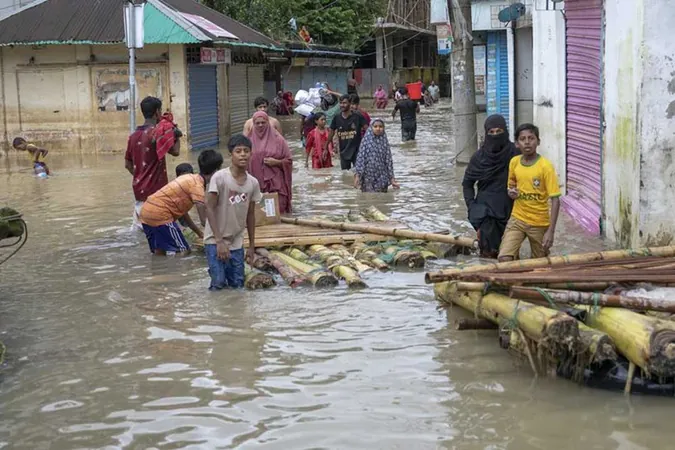
Resilience in Crisis: How Vaccination Saved Children During Bangladesh's Devastating Floods
2024-11-19
Author: Siti
Bangladesh has become a symbol of the climate crisis, confronting the relentless impact of yearly flooding. This year's extreme monsoon, which unfolded between June and September, has proven particularly devastating, with the eastern and southeastern regions experiencing their worst floods in 34 years. Approximately 1.2 million families found themselves trapped in rising waters for weeks, contending with fears of a secondary disaster: an outbreak of infectious diseases.
In the aftermath of such natural disasters, even the most resilient healthcare systems can be overwhelmed. However, this year, the anticipated surge in disease did not come to fruition. “Typically, areas affected by floods see outbreaks of pneumonia and measles,” said immunization expert Dr. Tajul Islam A Bari. “But thankfully, that did not happen this time, largely due to vaccinations protecting children against these illnesses.”
Amidst the chaos, particularly in areas like Lakshmipur Sadar Upazila, mothers worried for their children's health. Sharmin, a stay-at-home mom from Gopinathpur village, shared, “We were stranded for nearly two months. Despite the situation, I’m relieved that my 12-month-old son, Abdullah Al Tahsin, did not fall ill during this time.”
This positive outcome is supported by statistics that highlight the robustness of Bangladesh’s immunization efforts. According to 2023 data from WHO/UNICEF, the coverage for the third dose of the DTP (diphtheria, tetanus, and pertussis) vaccine stands at an astonishing 98%. Moreover, 97% of children in Abdullah's age group have received their first measles vaccination, and by 15 months of age, 99% are fully vaccinated against pneumonia with the pneumococcal conjugate vaccine (PCV).
Health professionals acknowledge that the high immunization rates contributed significantly to controlling the potential spread of infectious diseases during this calamity. Although the Directorate General of Health Services reported tens of thousands of cases of diarrheal diseases and other health issues during the flood, including nearly 5,000 respiratory infections, experts agree that the situation could have been far worse without vaccination.
“Usually, children in flood-affected regions suffer from various outbreaks, but we didn’t experience that in my district,” said Dr. Ahammed Kabir, the Civil Surgeon of Lakshmipur district. “While we did encounter some instances of diarrheal diseases, nothing reached epidemic levels, and routine immunization was a crucial factor in protecting the children.”
Dr. Kabir noted that the health system in Lakshmipur worked diligently to provide essential services, even amidst the chaos caused by the floods. Medical personnel set up temporary health camps in shelters and followed up on vaccinations as the waters receded. Many families faced challenges accessing healthcare, yet efforts were made to ensure that children continued to receive their vaccines. For example, Ankhi, a mother from the area, quantified this as her baby girl, Umme Zainab, who missed her scheduled vaccine, was able to catch up at a nearest center afterward.
Despite the inherent difficulties brought on by such disasters, health authorities like Dr. Abul Fazal Md. Shahabuddin Khan, Program Manager of the Expanded Program on Immunization (EPI), emphasized the importance of resilience and adaptability in times of crisis. "We worked on special coverage during holidays to ensure all children, especially those who missed vaccinations due to the floods, were vaccinated," he said.
As climate change increasingly disrupts the lives of those in vulnerable regions, it becomes imperative to innovate and strengthen the healthcare response to disasters. Experts are now calling for a structured rebound strategy within Bangladesh's health system to effectively manage ongoing challenges and protect the population in future emergencies.
The situation in Bangladesh highlights a harrowing reality, but it also illustrates the power of preparedness and community health initiatives. The emphasis on vaccination has proven to be a vital safeguard for some of the most vulnerable sections of society—our children—who rely on comprehensive healthcare systems to see them through adversity.



 Brasil (PT)
Brasil (PT)
 Canada (EN)
Canada (EN)
 Chile (ES)
Chile (ES)
 España (ES)
España (ES)
 France (FR)
France (FR)
 Hong Kong (EN)
Hong Kong (EN)
 Italia (IT)
Italia (IT)
 日本 (JA)
日本 (JA)
 Magyarország (HU)
Magyarország (HU)
 Norge (NO)
Norge (NO)
 Polska (PL)
Polska (PL)
 Schweiz (DE)
Schweiz (DE)
 Singapore (EN)
Singapore (EN)
 Sverige (SV)
Sverige (SV)
 Suomi (FI)
Suomi (FI)
 Türkiye (TR)
Türkiye (TR)